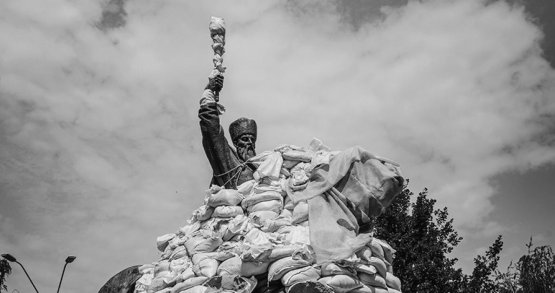In April this year the Ukrainian Decolonial Glossary was launched in Utrecht (Netherlands) at BAK (basis voor actuele kunst). The project is a collection of concepts from de-, -anti and post-colonial theories, featuring examples specific to the Ukrainian context. This is the first step towards creating an extensive database of relevant post- and de-colonial vocabulary with the aim of introducing, inspiring, enlightening, arousing interest and engaging in dialogue in a simple and accessible form.
Following the full-scale invasion, the themes of coloniality and decolonization began to gain popularity beyond academic circles like never before. Alongside this, questions arose about the importance of critically using these methodologies, rather than borrowing or copying, as rightly noted by the thinkers mentioned earlier. With this project, the curatorial team, consisting of Yuliia Elyas, Iva Naidenko, Anastasiia Omelianiuk and Nadiia Koval, aim to contribute to the dissemination and critical use of tools related to post- and decolonial concepts in Ukrainian contexts. This will not only deepen the understanding of Ukraine's past but also actively engage in the global intellectual struggle against colonial epistemologies.
Artslooker publishes one of the articles presented in the project — the coloniality of gender, by curator, researcher and writer Maria Vtorushina.
Ukrainian Decolonial Glossary is supported by the European Union under the House of Europe programme.
COLONIALITY OF GENDER / PATRIARCHY AND POWER
Gender studies in Ukraine focus on the fight of women and (gender)queer people for equal rights in a more or less patriarchal society where power is constantly being reconfigured. During the Soviet occupation, the notion of women's emancipation, equal rights and feminism were part of communist ideology, but were completely discredited by Soviet practice and existed only on paper. "Ukraine (like most Soviet colonies) missed the twentieth century in a very deep sense," writes Solomiia Pavlychko [3].
From the independence of Ukraine to the first years after the Revolution of Dignity, patriarchal dominance was clearly traced even in art. As Tamara Zlobina concludes, it was a structural feature of the field [4]. For this reason, Solomiia Pavlychko, Tamara Hundorova, and Oksana Zabuzhko turned to another fin de siecle — the end of the 19th century. The researchers have analyzed the Ukrainian circumstances of the birth of feminism, the peculiarities of the formation of national identity, and gender and sexuality in Ukraine within the borders of Austro-Hungarian and Russian empires in the works, epistolary heritage, social activities of Olha Kobylianska and Lesya Ukrainka. While the Austro-Hungarian Empire allowed the use of Ukrainian language in literary works, in the Russian Empire, it faced many prohibitions, and the Soviet regime resorted to numerous manipulations that masked its prohibitions, which, however, caused no less harm, destroying Ukrainian identity.
The concept of coloniality of gender was proposed by Maria Lugones, who developed Anibal Quijano's idea of the coloniality of power. According to Maria Lugones, the classification of people as 'men' (strong and smart), 'women' (weak) and 'others' was imposed by the expansion of European colonialism to the rest of the world [5]. The status of all the 'others' in this system is reduced to almost non-human. That is, heterosexuality with a binary understanding of gender is a product of an oppressive patriarchal system of power. The Russian government, trying to mimic the European empires [6], absorbed the worst shortcomings of the colonial / Modern gender system. Thus, through genocides and the myth of 'eternal Slavism' that was intended to imitate the status of the white Westerner, the Russian Empire, and the Soviet regime colonized the peoples of Ukraine, Belarus, the Caucasus, Central Asia, and the North.
Oksana Zabuzhko considers gender in terms of colonial relations between Ukraine and the Russian Empire / Soviet regime. The colonial violence of the Russian Empire / Soviet regime is defined by language rather than race, which is a key concept in criticism of European colonialism. Zabuzhko writes that the attitude to the Ukrainian language as the "wrong dialect of Russian" is part of the formula of colonial violence, which is “equally applicable to the white plantation owner, who considers the skin of black workers 'dirty', i.e. a 'soiled' white skin, and to the patriarchal gaze [...] on a man as the 'universal model' of the human breed, with a woman being, respectively, an 'imperfect man'” [7]. For Oskana Zabuzhko, the daughter of a Lviv intellectual who was sent into exile by the Stalinist regime, Russian is the language of jailers, wardens, and rapists. It reproduces the ugliness of patriarchal colonial power.
The crimes of post-Soviet, pro-Russian criminals in Ukraine of the 1990s as a collective rape of the Ukrainian female body are reproduced in the video Chronicles from Fortinbras (2001), a collaboration between Oksana Zabuzhko and the artist Oksana Chepelyk, which was named after Zabuzhko's book of the same name [8]. The rise to power of the Russian protege Viktor Yanukovych and his flight to Rostov-on-Don after the Revolution of Dignity illustrate the reality of this particular axis of patriarchal criminal power.
The beginning of an active (queer)feminist discourse in Ukrainian art can be traced in the artistic practices of Maria Kulikovska. The practices of Kulikovska, who was born and grew up in Crimea, emancipate the female body, strengthen the agency of women and (gender)queer people who are repressed precisely by Russian colonial power structures. Having seized the Izolyatsia art center in Donetsk in 2014, Russian militants shot Kulikovska's sculptures — copies of the artist's naked, defenseless body. After the annexation of Crimea by Russia, the invaders banned Kulikovska from entering her home region. Since the beginning of the war in 2014, Maria Kulikovska has been constructing ways to counter Russian colonial violence. By reproducing the destruction of her sculptural copies as not only a therapeutic practice, the artist metaphorically takes away an act of violence from the aggressor, emphasizing that only she can and will control her body.
On the other hand, Europe also produces and applies colonial patriarchal tropes against Ukrainian women. Toxic stereotypes about sex workers or about "emigration marriages" create additional barriers and boundaries. In the long-term performance Body and Borders, Maria Kulikovska documented her marriage to the Swedish artist Jaqueline Shabo. Part of the documentation elucidates the oppressive logic of the European bureaucracy in relation to Ukrainian women and (gender)queer people. However, in this performance, Kulikovska most of all emphasized her own choice as a woman, following her desires and the importance of self-determination.
Thus, although the theory of the coloniality of gender allows us to explain many processes in the historical relations between Ukraine and these two empires, it is only part of the current landscape of resistance. Defending equal rights for women and (gender)queer people, many of whom are today defending the country, takes place even in the Ukrainian army, which no longer has an exclusively masculine image. In Europe, Ukrainian women and (gender)queer people stand in solidarity for the sake of visibility and the fight against cultural stereotypes. Gender variability, like the Ukrainian language, are powerful tools for resisting and countering aggression. And these tools can no longer be seen strictly in the context of subordination.
Endnotes:
1. Rebecca Barth, Ukraine’s Female Combatants: The Influence of Conflict on Gender Roles and Empowerment. Gender and Power in Eastern Europe. Changing Concepts of Femininity and Masculinity in Power Relations (Cham: Springer Nature Switzerland, 2021), 63–82, p. 64
2. Rebecca Barth, Ukraine’s Female Combatants: The Influence of Conflict on Gender Roles and Empowerment. Gender and Power in Eastern Europe. Changing Concepts of Femininity and Masculinity in Power Relations (Cham: Springer Nature Switzerland, 2021), 63–82, p. 67
3. Solomea Pavlychko, Feminism in post-communist Ukrainian society. Women in Russia and Ukraine / edited by Rosalind Marsch, (Cambridge: Cambridge University Press, 1996), 305–314. P.305
4. Тамара Злобіна, Про сучасне жіноче мистецтво та забуті репліки, Громадське радіо 18.11.2014.https://hromadske.radio/podcasts/antena/tamara-zlobina-pro-suchasne-zhinoche-mystectvo-ta-zabuti-repliky
5. Maria Lugones, “Heterosexualism and the Colonial/Modern Gender System”. Hypatia, Vol. 22, No.1, Writing Against Heterosexism (Winter, 2007),186–209.
6. Madina Tlostanova, “The Janus-faced empire distorting orientalist discourses: Gender, race, and religion in the Russian/(post)Soviet constructions of the Orient” Worlds and Knowledges Otherwise / A Web Dossier. On the Decolonial (II) – Gender and Decoloniality Volume 2, Dossier 2, Spring 2008, (Duke University Press, Durham) http://www.jhfc.duke.edu/wko/dossiers/1.3/contents.php 24
7. Oksana Zabuzhko, Жінка-автор у колоніальній культурі, або знадоби до української гендерної міфології. (Female Author in Colonial Culture, or the Tools for Ukrainian Gender Mythology). An authorised version of the lecture A Female Author in Colonial Culture: Ukrainian Example, presented in November 1996 during the book tour at Yale, Harvard, and Columbia universities.https://exlibris.org.ua/zabuzko/r05.html
8. Оксана Забужко, Хроніки від Фортінбраса. (Київ: Видавництво «Факт», 1999), 340 с.
To read more articles about contemporary art please support Artslooker on Patreon
Share:




